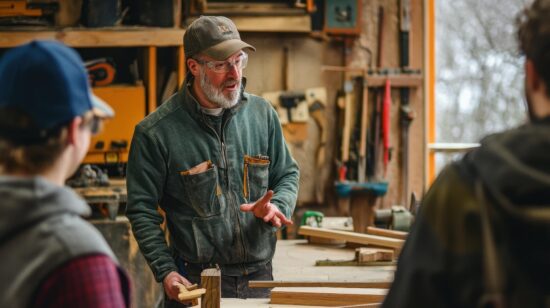Woodworking, a timeless craft that combines artistry with practicality, has been a cornerstone of human civilization for centuries. From hand-hewn furniture to intricate decorative carvings, woodworking represents more than the act of shaping wood—it embodies culture, tradition, and the ingenuity of the human spirit. Yet, like many traditional crafts, woodworking faces a challenge in sustaining its relevance as older generations of artisans retire without passing their skills to the next generation. The solution lies in mentorship. Angelo Dellomo of Mays Landing emphasizes that teaching the next generation of woodworkers is not just about ensuring the survival of this craft but also about fostering a deep appreciation for the art form and its enduring value.
Mentorship: A Bridge Between Generations
Mentorship is the lifeline of any craft. In woodworking, it offers an invaluable way for experienced artisans to share their knowledge, techniques, and passion with those who are eager to learn. Through mentorship, older generations impart not only technical skills but also a sense of respect for the materials, tools, and processes that make woodworking a meaningful endeavor.
The mentor-mentee relationship goes beyond instruction; it builds a connection between tradition and innovation. Young woodworkers learn not just how to use a chisel or measure a dovetail joint but also the stories and philosophies behind the craft. This transfer of wisdom often sparks a deeper appreciation for the artistry and purpose of woodworking, transforming it from a simple skill into a lifelong passion.
Preserving Traditional Techniques
Mentorship in woodworking ensures that traditional techniques are not lost to time. In today’s fast-paced world, where mass production dominates, the intricacies of handcrafting are often undervalued.
Through one-on-one teaching, mentors can preserve methods such as hand-planing, mortise-and-tenon joinery, and steam bending—skills that might otherwise fade into obscurity. These techniques carry historical and cultural significance, connecting modern woodworkers to their roots and inspiring them to innovate while respecting tradition.
For example, a mentor might teach a mentee how to hand-cut dovetail joints, a hallmark of fine craftsmanship. While machines can replicate the appearance of dovetails, hand-cutting them demands patience, precision, and an understanding of wood grain—all of which deepen a student’s connection to the material and their work.
Building Confidence and Problem-Solving Skills
One of the most rewarding aspects of mentorship is witnessing a mentee grow in confidence. Woodworking, with its challenges and learning curve, offers numerous opportunities for young artisans to develop problem-solving skills.
Mentors guide mentees through inevitable mistakes—splintered edges, misaligned cuts, or warped boards—teaching them to troubleshoot and adapt. These lessons foster resilience, creativity, and critical thinking. A seasoned mentor might share their own experiences of trial and error, reminding mentees that every flaw is a stepping stone toward mastery.
Moreover, working alongside a mentor provides hands-on experience that no book or video tutorial can replicate. Watching an expert handle tools, assess materials, and approach projects inspires mentees to refine their own techniques and develop their unique style.
Fostering a Sense of Community
The woodworking community thrives on collaboration and shared passion. Mentorship plays a key role in sustaining this sense of camaraderie. By connecting seasoned woodworkers with novices, mentorship creates opportunities for mutual learning and the exchange of ideas.
Woodworking guilds, community workshops, and makerspaces are excellent venues for fostering these relationships. These spaces encourage both formal and informal mentorship, where beginners can seek advice, learn techniques, and build connections with like-minded individuals.
Through mentorship, woodworking transcends individual projects and becomes a collective experience. Mentees often gain not just a teacher but a lifelong friend and advocate who will celebrate their successes and guide them through challenges.
Instilling Appreciation for Craftsmanship
Beyond technical skills, mentorship nurtures an appreciation for the intangible qualities of woodworking: patience, attention to detail, and respect for the material. Wood is not a static medium—it’s a living, breathing substance that requires understanding and care.
Mentors teach their protégés to respect the natural beauty of wood, emphasizing sustainable practices and ethical sourcing of materials. This instills a sense of responsibility in young woodworkers to honor the craft and its environmental impact.
Appreciation for craftsmanship also extends to valuing the time and effort behind each piece. In an age of instant gratification, mentorship reminds young artisans of the beauty in slow, deliberate work. The satisfaction of crafting something by hand—a chair, a table, or even a small jewelry box—is a feeling that no machine can replicate.
The Legacy of Mentorship
The true legacy of mentorship in woodworking lies in its ripple effect. A mentor’s teachings inspire mentees to not only hone their skills but also pass them on to others. This cycle ensures that the craft continues to evolve and thrive.
As mentees become mentors themselves, they contribute their own innovations, blending traditional techniques with modern technology and design. This progression keeps woodworking dynamic and relevant while honoring its roots.
How to Get Involved
For those interested in mentoring or learning woodworking, the opportunities are plentiful. Local woodworking clubs, community centers, and online forums often host workshops and mentorship programs.
For mentors, sharing your knowledge is as simple as inviting a novice to your workshop or demonstrating a technique at a community event. For aspiring woodworkers, seeking out mentors requires curiosity, dedication, and a willingness to learn.
Mentorship in woodworking is about more than teaching technical skills; it’s about passing down a love for the craft and a respect for its history. By nurturing the next generation of woodworkers, mentors ensure that this timeless art form continues to inspire and enrich lives. In a world increasingly driven by speed and automation, woodworking stands as a testament to the value of patience, precision, and creativity. Through mentorship, we can preserve the artistry of woodworking and empower the next generation to carry its legacy forward.
